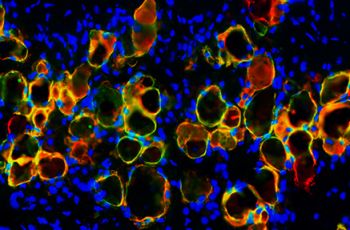
WASHINGTON (June 9, 2014) — Six dietary guidelines – more aggressive than previous cancer prevention advice will be unveiled in the June 30 issue of the Journal of the American College of Nutrition.
The cancer prevention guidelines, emphasizing a diet rich in plant-based foods, such as soy beans and cruciferous, allium, and carotenoid vegetables, are based on the principle that diet changes are justified, even when evidence on certain issues are up for debate. The recommendations urge the same kind of precautionary approach health experts took against tobacco decades earlier, before smoking bans were enforced, and warn about the association between cancer and alcohol, red and processed meats, dairy products, and carcinogens in well-cooked meats, including beef, poultry, and fish.
“The key recommendation is to build meals around fruits, vegetables, and legumes,” says study author Neal Barnard, M.D., president of the nonprofit Physicians Committee and an adjunct associate professor of medicine at the George Washington University School of Medicine and Health Sciences. “Plant-based foods provide an antioxidant boost and help promote a healthy weight, reducing the risk for all types of cancer in the long run.”
The six dietary recommendations to reduce risk of several types of cancer are:
- Limit or avoid dairy products to reduce the risk of prostate cancer.
Findings: Consuming thirty-five grams of dairy protein each day, the equivalent of one and a half cups of cottage cheese, increases risk of prostate cancer by 32 percent. Drinking two glasses of milk each day increases risk of prostate cancer by 60 percent.
Note: Calcium supplements appear to have the same effect as milk intake. Men who supplement with more than 400 milligrams of calcium per day increase risk for fatal prostate cancer by 51 percent.
- Limit or avoid alcohol to reduce the risk of cancers of the mouth, pharynx, larynx, esophagus, colon, rectum, and breast.
Findings: One drink per week increases risk of mouth, pharynx, and larynx cancers by 24 percent. Two to three drinks per day increase risk of colorectal cancer by 21 percent.
Note: The alcohol itself (rather than additives) appears to be the cause of cancer, and all types of alcoholic beverages (wine, beer, and spirits) are problematic.
- Avoid red and processed meats to reduce the risk of cancers of the colon and rectum.
Findings: Each 50-gram daily serving of processed meat, equivalent to two slices of bacon or one sausage link, increases risk of colorectal cancer by 21 percent. Each 120-gram daily serving of red meat, equivalent to a small steak, increases risk of colorectal cancer by 28 percent.
Note: The heme iron, nitrites, heterocyclic amines, and overabundance of essential amino acids in red and processed meats are all believed to contribute to cancerous cell growth in the body.
- Avoid grilled, fried, and broiled meats to reduce the risk of cancers of the colon, rectum, breast, prostate, kidney, and pancreas.
Findings: Four types of heterocyclic amines (HCAs) are associated with cancer of the colon and rectum. HCAs form from creatine and amino acids in cooked skeletal muscle, increasing with higher cooking times and higher temperatures. When ingested, HCAs can disrupt DNA synthesis.
Note: In addition to the cancers listed above, HCAs are also associated, to a weaker extent, with cancers of the breast, prostate, kidney, and pancreas.
- Consume soy products to reduce risk of breast cancer and to reduce the risk of recurrence and mortality for women previously treated for breast cancer.
Findings: Evidence from Asian and Western countries shows that soy products are associated with reduced cancer risk. Chinese women who consume more than 11.3 grams of soy protein, equivalent to half a cup of cooked soybeans, each day during adolescence have a 43 percent reduced risk of premenopausal breast cancer, compared with women who consume 1.7 grams. Research in Shanghai shows that women with breast cancer who consume 11 grams of soy protein each day can reduce mortality and risk of recurrence by about 30 percent. U.S. populations show similar findings: the higher the isoflavone intake from soy products, the less risk of mortality and recurrence in women with breast cancer.
Note: When choosing soy products, opt for natural forms, such as edamame, tempeh, or organic tofu, as opposed to soy protein concentrates and isolates, common in powders and pills.
- Emphasize fruits and vegetables to reduce risk of several common forms of cancer.
Findings: Fruits and vegetables, especially leafy greens, help reduce overall cancer risk. A high intake of cruciferous vegetables, such as broccoli, kale, and cabbage, is associated with an 18 percent reduced risk of colorectal cancer and reduced risk of lung and stomach cancers. Women who consume the most carotenoid-rich vegetables, such as carrots and sweet potatoes, lower their risk of breast cancer by 19 percent. Overall, women who consume the highest quantities of any kind of fruit or vegetable reduce breast cancer risk by 11 percent. A high intake of tomato products has been shown to reduce risk of gastric cancer by 27 percent. Garlic and other allium vegetables, such as onions, significantly reduce risk for gastric cancer, while a Western diet (high amounts of meat and fat with minimal amounts of fruits and vegetables) doubles therisk.
Note: Some components in soybeans, green tea, turmeric, grapes, tomatoes, and other plant foods have the ability to regulate apoptosis (a natural process for destroying unhealthy cells), an important pathway for cancer prevention.
###
This Press Releases posted courtesy of the Physicians Committee for Responsible Medicine.


